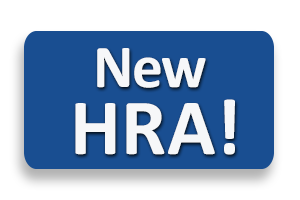Health Reimbursement Arrangements
Do you remember the days when employers could change from a $500 deductible plan to a $5,000 deductible plan and save 40-50% on insurance premiums? Then those same employers would offer a Health Reimbursement Arrangement (HRA) to cover most or all the deductible increase for employees who have chronic conditions or who experience unexpected medical events. The net result provided employers with significant savings while providing employees with substantially similar benefits. Those days still exist.
The Internal Revenue Service (IRS) recently proposed rules that would expand the definition of medical expenses allowed under Section 213(d) of the Internal Revenue Code (“Code”). This part of the Code is what helps guide the types expenses that can be reimbursed through a Health Reimbursement Arrangement (HRA), Flexible Spending Account (FSA) or Health Savings Account (HSA).
Health Reimbursement Arrangements (HRAs) have been on a roller coaster the past five years. Some laws and regulations have limited the types of HRAs that an employer can offer whereas other laws and regulations have created new HRA options for employers to offer. Below is a summary of the types of HRAs employers can offer to employees.
As a result of regulations supplementing the Affordable Care Act (ACA), employers were limited to offering 3 types of HRAs.
The Departments of Labor, Health and Human Services and the Treasury (collectively, the Departments) released new guidance on June 13, 2019 which permit a new type of Health Reimbursement Arrangement, referred to as an Individual Coverage Health Reimbursement Arrangement (ICHRA).
Flexible Benefit Service LLC (Flex) offers debit cards as a reimbursement option with several different Health Reimbursement Arrangement (HRA) plan designs.
IRS Revenue Procedure 2017-58 was released last week. It includes a number of inflation adjustments to various benefits and other items for 2018 including the following for Consumer-Driven Accounts:
Flexible Benefit Service LLC (Flex) is excited to tell you about the 21st Century Cures Act which was signed into law by President Obama on December 13, 2016. While the law primarily focuses on healthcare innovations and enhancing medical research, it also created a new type of Health Reimbursement Arrangement (HRA), referred to as a "Qualified Small Employer HRA."
The fourth installment of the Patient-Centered Outcomes Research Institute (PCORI) fees will be due on July 31, 2016.
As its name suggests, PCORI is a research institute, and it was created by the Affordable Care Act (ACA) as a way to improve clinical effectiveness. It is partially funded by fees charged to health plans.
The following list contains information and some reminders about the upcoming PCORI fee that is due:
Benefits Buzz
Enter Your Email









